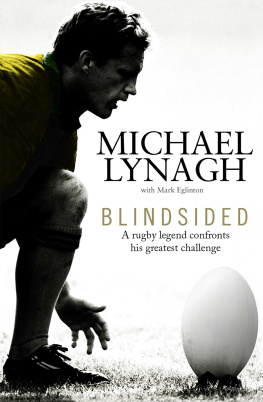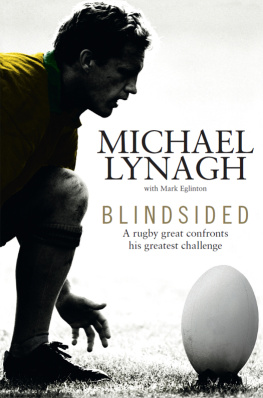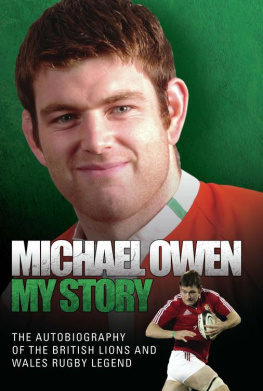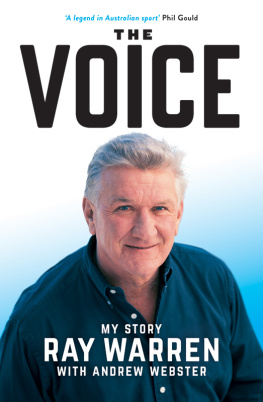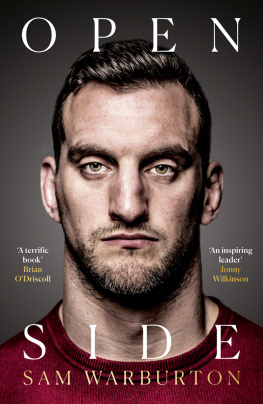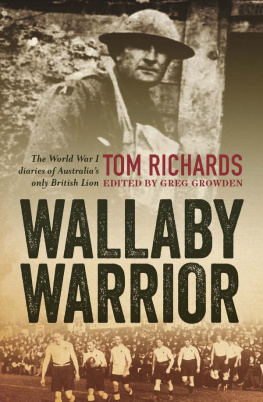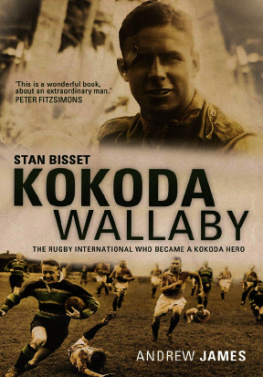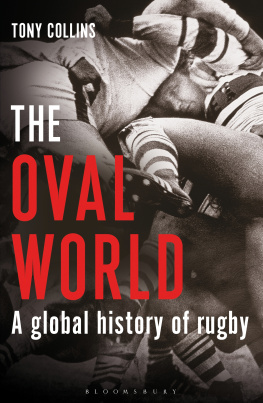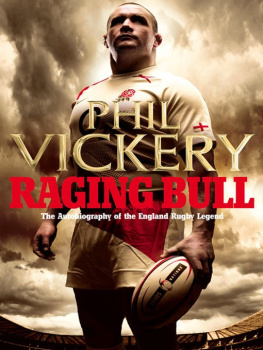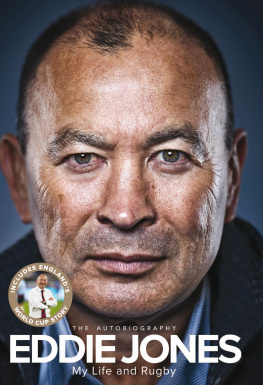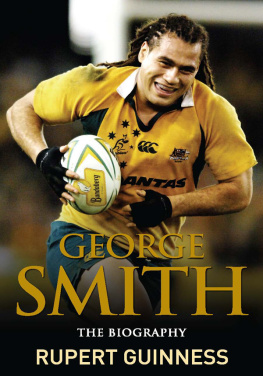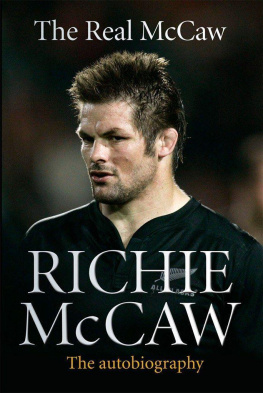Michael Lynagh won 72 Test caps and retired from international rugby in 1995 as the world record points scorer with 911, a total which remains an Australian record. An inspirational playmaker, Lynagh, who also won 100 caps for Queensland, made his Test debut in 1984 and was part of Australias Grand Slam-winning team later that year. He was vice-captain of Australias World Cup-winning side in 1991 and, after captaining Australia to the quarter-finals of the 1995 World Cup, he retired from international rugby and joined Saracens in the UK at the start of the professional era.
THERE ARE SO MANY people to thank regarding this project and in my life in general.
To all the people in the rugby world I have played with and against, who have coached and cajoled me and in some way contributed to my wonderful rugby life. Thank you. It has been an extraordinary journeyone to which I owe everything. Thanks too to those of you who were called upon to contribute interviews and to Alan Jones for his wonderful foreword.
To Dr. Robert Henderson, Dr. Craig Winter, their wonderful team and the incredible staff in the intensive care unit at the Royal Brisbane and Womens hospitalyou are amazing. You deal with adversity and extreme stress everyday with care, calmness and professionalism beyond what can be reasonably expected.
To all the people at HarperCollins both in Australia and the UK thank you for your belief in this project. My friends at Essentially who put together the deal for me many thanks to you too.
A huge debt of gratitude to Mark Eglinton who helped me put this story together. We had not previously met and we originally connected via social media, several months after my stroke, where we discussed the idea of doing a book. Although he was not from a rugby journalism background, what he brought from other areas of life, in combination with his understanding of the game, was very appealing. He convinced meby writing a sample based on one of our first conversationsthat people would actually be interested in my story. Quite simply, he was able to capture the story and my personality very well. Mark has helped every step of the way and has moulded our many conversations into what you now have in your hands. This book would not have happened without his enthusiasm, passion and interest in it. It has been a pleasure working with him and I feel we have become good friends. Thank you, Mark, you have been magnificent. Thanks also must go to Marks wife, Linda, for putting up with her husband speaking to me at all hours of the day.
Intensive Care Unit of the Royal Brisbane and Womens Hospital, April 2012
IT WAS PITCH BLACK and that was my choice. Via an uncomfortable process of elimination, Id discovered that if I kept my eyes closed, somehow the pain in them lessenedthe opposite to what Id expected. The crushing pain in my head was much harder to dismiss, though. My head was screaming. Not achingscreaming. My cerebellum was swollen, pressing down to within fractions of millimetres of my brainstem. I could almost feel it straining within the confines of my skull. Any contact would be catastrophic.
Ive been blindsided by a few big hits from back-row forwards over the yearsthe Mark Shaws and Eric Champs of this world have clobbered me a few times. No amount of tactical awareness or raw, self-preserving instinct could avert those. Sometimes youre just going to get hit. No warning, just a sudden and painful impact. Blindside hits are always the worst. You dont see them coming. But its all part of what you sign up for when you play rugby at the highest level. This was real pain. And I hadnt seen it coming either.
As I lay in my hospital bed hooked up to all kinds of monitorsmy bedclothes drenched with sweat, yet my bones frozen to their coreI was presented with the most important decision I would ever have to make. This was a choice far tougher than whether to keep the ball in play or kick for the corner; pass or make a cut inside a fast-closing centre: I had to decide whether I had the strength and desire to continue living. It was a profound moment.
It occurred to me right then that almost every facet of life, much like a game of rugby, boils down to decisions made at critical moments. The obvious difference being that a wrong call on the field might lose you the game, whereas in lifes case, choices can have a much more far-reaching effect.
Given my awful predicament, the calmness with which I was able to evaluate the situation shocks me a little when I consider it now. First, I thought about my loving wife, Isabella. Shell be okay, I admitted to myself. Lets face itas much as we were in love and she meant the world to me, she was still pretty young with a long life ahead of her.
Then I turned my attention to my three boys: Louis, Thomas and Nicolo. I flinched inwardly for a moment as I considered the prospect of them growing up without me. Without a dad. But as hard as it was to accept, I had to acknowledge that theyd ultimately be fine too. Yes, in time, without meMichael, Dadeveryone would be all right. Their lives would go on. That was reality.
It seemed so strange to be thinking in this cold, pragmatic way, and for someone as intrinsically positive as I am it was certainly a barometer of how exhausted I was. And of how much my brain hurt. It was as if Id become detached from my addled mind and exhausted body and was a mere stranger looking at my situation from a purely practical perspective: This is how it will be.
Maybe it was easier that way? After all, to remove emotion from the equation would certainly make my decision more straightforward, and that, at that precise moment, was perhaps what I needed. Selfishly, I just wanted no more pain and relief from my seemingly endless exhaustion. It might sound weak, but I was just too tired to keep going.
It also occurred to me that Id had a really good life. Id played top-level rugby successfully, worked in great jobs and, most importantly, had a wonderful family and a wide circle of true friends; I was very lucky. Part of me thought, This isnt where I want it to end, but if it has to, I cant really complain. Id reached that point.
Something was distracting me from this strange feeling of resignation, though. Initially it was irritating, but then it focused my mind and made me a little curious. In retrospect, it seems to me that because my vision was impaired, my sense of hearing had been greatly enhanced, as if to compensate.
Consequently, I had a heightened awareness of the continual, chaotic noise in the space around me, mostly made by the many machines I was attached to. Rest was impossible, given the loudness of the racket, and it began to really bug meto the point where I vaguely remember asking if the machines could somehow be turned down. But the nursing staff told me that the alarms were necessary and that they werent actually very loud anyway.
But as day merged with night and the unrelenting headache and the morphine drip forced me in and out of fitful sleep, I gradually became aware of some kind of order within the background cacophony. I had to focus hard to identify it, but when it came to me it seemed really obvious.
Thats Canned Heat, I said to myself.
It was almost comical in its incongruity. I like the song; its really catchy.
Why this song and why here?
In my head, the sounds of all the bells and whistles were combining, again and again, to mimic the short flute intro to the song Going up the Country. Somehow their pitch and tone and the order in which each noise was produced by an alarm, sensor or monitor kept that two or three-bar musical motif looping round and round all day and night. I was pleased with myself that Id managed to figure it out. Of course the song itself wasnt important. But the fact that it was a song was. It reminded me that the world I used to inhabit was still there, albeit a little out of reach for the time being.
Next page
